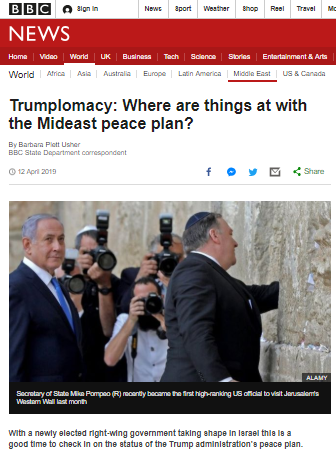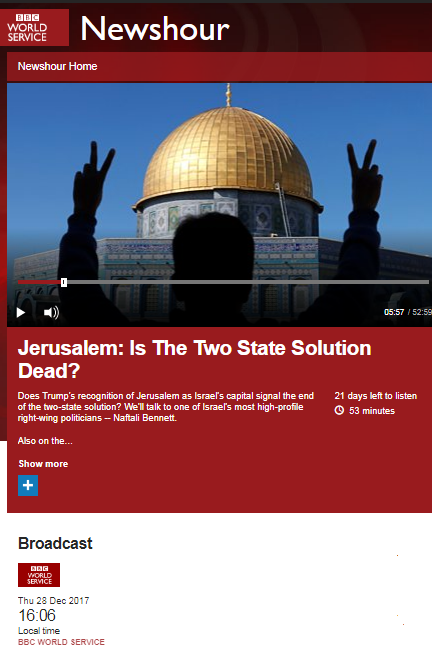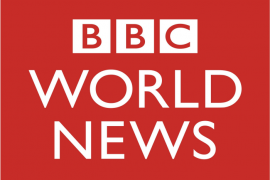As we have seen in recent weeks, the BBC is already gearing up for the anticipated publication of the US administration’s peace proposal with some very specific framing.
BBC’s Plett Usher continues to promote her Israel narratives
BBC’s peace plan framing and speculations – part one
BBC’s peace plan framing and speculations – part two
“That framing has included the failure to clarify to audiences that the Palestinian Authority has already rejected the US initiative even before its publication, the failure to clarify that, significantly, the Palestinian Authority does not represent all the Palestinian factions and a total absence of information concerning Palestinian rejection of past peace proposals.
Additionally, BBC audiences have seen the two-state solution presented as “the formula for peace negotiations” but with that term only partially explained: the all-important phrase “two states for two peoples” is consistently absent from BBC presentation. Instead, audiences repeatedly see the two-state solution defined according to the Palestinian interpretation of it as meaning a Palestinian state on all of the territory occupied by Jordan and Egypt between 1948 and 1967.
Unsurprisingly, the BBC’s framing portrays the success of the as yet unpublished peace plan as dependent upon Israeli actions alone, with the Palestinian side reduced to a passive entity.”
So what approach is the Palestinian Authority (with its new unelected prime minister about whom BBC audiences have yet to hear) taking ahead of the anticipated reveal of the US proposal? Veteran Palestinian affairs journalist Khaled Abu Toameh has been keeping track.
“Palestinian officials say that PA President Mahmoud Abbas has requested an urgent meeting of the Arab League, in an attempt to win Arab support for Palestinian opposition to the plan. […]
The Ramallah-based officials are particularly worried that key Arab countries, such as Saudi Arabia, Egypt and the United Arab Emirates, have thus far failed to endorse the Palestinians’ fierce opposition to what they perceive to be the “biggest conspiracy to liquidate the Palestinian cause and national rights.”
The Arab response to what has been leaked about the “deal of the century” appears to be toned down in comparison with the rhetoric employed by Abbas and other Palestinian officials. In the past two years, Abbas and his representatives have repeatedly denounced the unseen plan as an “American-Zionist conspiracy,” dubbing it as “the slap of the century” and the “deal of shame.”
They have also launched scathing attacks on Trump’s “Zionist team” – US Ambassador David Friedman and presidential advisers Jason Greenblatt and Jared Kushner, whom they hold responsible for a plan they believe fully endorses the policies of Prime Minister Benjamin Netanyahu and the Right in Israel. […]
The Fatah representative and other Palestinian officials in Ramallah said that they have more confidence in the EU, Russia and China than in their Arab brothers.”
If that portrayal of the topic sounds familiar that is because BBC framing of the story so far – not least that of the BBC’s US State Department correspondent – has closely adhered to the talking points put out by the PLO and PA.
Abu Toameh also notes that:
“…Abbas is also aware that under the current circumstances, he doesn’t have many options to thwart the “deal of the century,” especially in light of divisions among the Palestinians and the absence of an Arab consensus toward the peace plan. Even worse, Abbas is convinced that the Hamas rulers of the Gaza Strip are “in collusion” with the Americans and Israel to establish a separate Palestinian state in the coastal enclave.
The only card Abbas holds at this stage is the threat to revoke all agreements signed between the Palestinians and Israel, including the Oslo Accords. In the coming weeks, Abbas is planning to convene various forums of the Palestinian leadership in Ramallah to discuss the Palestinian measures in response to the “deal of the century.” These measures, according to Palestinian sources, include revoking PLO recognition of Israel and cutting all ties with Israel, including security coordination in the West Bank.”
And what of Hamas’ approach to the as yet unpublished plan? While the BBC serially excludes the terror group from its reporting on the topic (with the result being that audiences are left with the inaccurate impression that there is one unified Palestinian voice), its stance is obviously relevant and Khaled Abu Toameh has documented that too.
“Hamas, of course, is strongly opposed to US President Donald Trump’s upcoming plan for peace in the Middle East, also known as the “Deal of the Century.” How can Hamas accept any peace plan that recognizes Israel’s right to exist? Hamas is opposed to the Deal of the Century not because the plan doesn’t offer the Palestinians enough land. It is opposed to the plan because it doesn’t offer the Palestinians all the land, from the Mediterranean Sea to the Jordan River. […]
Palestinian Authority President Mahmoud Abbas has undoubtedly read the Hamas charter. He knows that, as a Muslim, if he accepts any peace plan that does not include the expulsion of all Jews from their homes, he will be denounced by his rivals in Hamas as a traitor. Abbas is also aware of Hamas’s threats to shower Israel with rockets. He knows that at the same time as Hamas attacks Israel, it will seek to flatten him for “betraying” Arabs and Muslims in “allowing” Jews to continue living in “their” state. This is the Palestinian reality that the Deal of the Century is about to be dealt.”
Yet meanwhile, the BBC continues to ignore Palestinian internal politics and instead chooses to herd its audiences towards the view that if the US peace proposal goes nowhere, that will be because of the US “administration’s embrace of the Israeli government’s right-wing positions”.




